八下unit4教案
八年级英语下册 Unit4 如何做"对划线部分提问"教案 冀教版

冀教版英语八年级下Unit4 如何做"对划线部分提问"教案如何做“对划线部分提问”?Step1:复习巩固、激情导入复习:提问Lesson31知识点1-4导入:学习英语以来,我们做了许多对划线部分提问的,这部分题型较为复杂,今天,我们就小结一下?Step2:出示目标、明确任务1.掌握对划线部分提问的做题技巧及注意事项;2.灵活运用对划线部分提问的基本类型;?Step3:自主学习、合作探究(一)、做题方法1、找:找出能替换划线部分的特殊疑问词。
2、变:把原句(去掉划线部分之后)变为一般疑问句形式。
3、连接:将特殊疑问词与一般疑问句形式连接起来。
举例:A. They are at school now.1)找:where (2)变:are they now? (3)连接:Where are they now?B. He will buy a bike tomorrow.1)找:what (2)变:will he buy tomorrow ? (3)连接:What will he buy tomorrow ?C. She likes watching TV in the evening.1)找:when (2)变:does she like watching TV? (3)连接:When does she like watching TV?(二)、基本类型1、对“物” 提问用What.如:1)This is an orange →What is this?2)We can see a cat under the desk. →What can you see under the desk?2、对“学校、年级、班、排、组、号”的数词提问用What,这些名词要紧跟What 之后如:1.They are in Class One. →What class are they in?2.Jim's bus is Number Twenty-nine.→What number is Jim's bus?3、对“颜色” 提问用What color,如颜色作定语,What color后要跟被修饰的名词。
人教版八年级英语下册教案(RJ) Unit 4
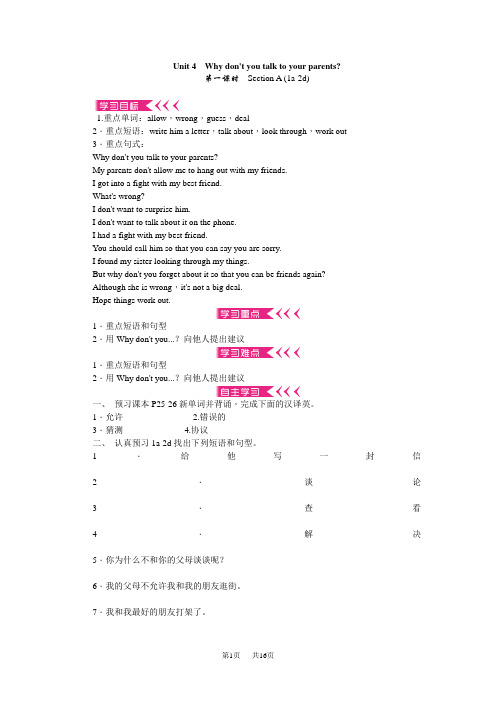
Unit 4Why don't you talk to your parents?第一课时Section A (1a-2d)1.重点单词:allow,wrong,guess,deal2.重点短语:write him a letter,talk about,look through,work out3.重点句式:Why don't you talk to your parents?My parents don't allow me to hang out with my friends.I got into a fight with my best friend.What's wrong?I don't want to surprise him.I don't want to talk about it on the phone.I had a fight with my best friend.You should call him so that you can say you are sorry.I found my sister looking through my things.But why don't you forget about it so that you can be friends again?Although she is wrong,it's not a big deal.Hope things work out.1.重点短语和句型2.用Why don't you...?向他人提出建议1.重点短语和句型2.用Why don't you...?向他人提出建议一、预习课本P25-26新单词并背诵,完成下面的汉译英。
1.允许____________ 2.错误的____________3.猜测____________ 4.协议____________二、认真预习1a-2d找出下列短语和句型。
初中英语人教新目标版八年级下册 Unit 4 Section B 教案

Unit 4Why don’t you talk to your parents?1. Talk about the problems.2. Learn the new language points.1. The differences of“cut up , cut off, cut out”.2. The usage of“compare. . . with. . . ”.现如今父母与青春期孩子们之间的矛盾越来越多, 有的孩子经常对父母发火, 甚至几天不说话。
请以“How to get along well with parents”为题, 阐述父母与孩子间产生矛盾的原因, 以及改善关系的解决措施。
词数: 100词左右。
要点可以包括:1)产生矛盾原因: 父母过分关注分数; . . .2)改善关系的措施: 多交流; . . .How to get along well with parentsNowadays, more and more teenagers can’t get along well with their parents. They often get mad at their parents and some of them even don’t talk with their parents for several days. Why does the relationship between teenagers and parents get so bad? Here are some reasons.First, much attention is paid to teenagers’ grades in exams by parents. They only want to see their kids studying all the time without having a rest or having their own time. Second, both teenagers andparents don’t spend much time in communicating with each other. Parents are always busy with their work. They even don’t understand each other.How to make the relationship better? The followings are the ways to solve this problem. First of all, parents are supposed to spend more time with their f amily. It’s important to take some time to communicate if there are some problems. Besides, both parents and teenagers should find a right way to express their love and talk about their own thoughts to each other. All the problems can be solved by love and understanding.I hope the relationship between parents and teenagers can be good at any time. If both of them would like to spend time and efforts in how to solve the problems between them, they will have a happy and wonderful life together.本课时从一开始即给了学生明确的教学任务, 达到开门见山的效果, 让学生学习的目标性更强, 小组练习的方式也能加强学生对知识点的巩固。
新目标八年级英语下册unit4教案
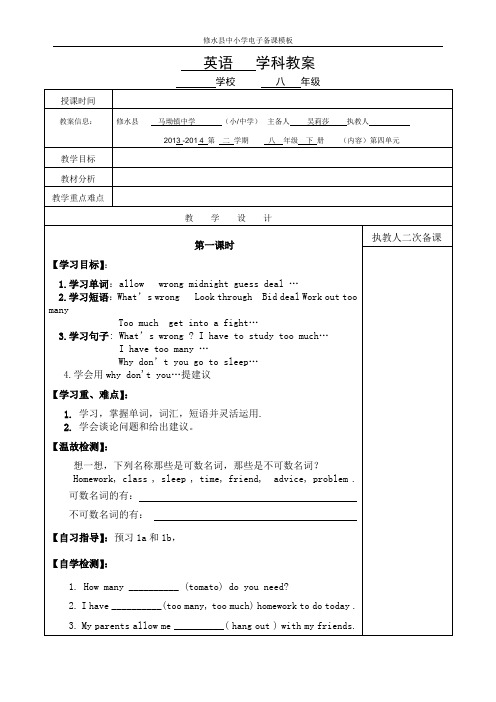
你应该再多等一会儿。
--- I have a very bad cold.我感冒很厉害。
--- You should lie down and have a rest.你应该躺下,多喝水。
【当堂训练】:
一.单选:
( )1.How about ____ calendar?
(5), Let’s do sth…?
(6). What should Ido…?( should表示请求、征询对方意见)
e.g.:What should I get my dad for his birthday?
我该送给爸爸什么作为他的生日礼物呢?
【当堂训练】:
一.汉译英:
1.去睡觉________________2.Get into a fight________
Today my speech topic isLearning to get along with our parents.
These days ,most of us feel it hard to get along with our parents.
___________________________________________________________________________________________________________________________________________________________________________________
(1).be afraid of something害怕
Don't be afraid of the dog.别害怕那只狗。
人教版英语八下unit4运用翻转课堂模式教案

人教版英语八下unit4运用翻转课堂模式教案In the flipped classroom model, the traditional notion of the classroom is inverted. The basic premise involves students engaging with new material at home, and then using classroom time to deepen understanding through problem-solving activities and discussion. This approach is particularly effective in language learning, where exposure to language and opportunities for practice are crucial.Unit 4 of the 8th grade English textbook under the People's Education Press curriculum can be approached using the flipped classroom model by dividing the unit into manageable segments for students to study at home, followed by interactive activities in class.At-Home Learning:。
Students begin by watching a series of videos created by the teacher that cover the new vocabulary, grammar points, and reading comprehension strategies that are the focus of Unit 4. These videos are supplemented with online quizzes and exercises that provide immediate feedback.In-Class Activities:。
人教版八年级英语下册unit4教案

Unit4Why don'tyou talk to your parents教材解读 本单元的中心话题是人际交往,与学生实际生活紧密相关,主要探讨当代中小学生 所面临的种种压力和困境,并针对这些问题给予合理的建议。通过学习本单元,学生应 能询问、陈述自己或他人的困难和麻烦,能针对别人的困境提出解决的办法和建议。语 法部分主要是关于学生能正确使用情态动词could,should表达建议或劝告,能正确使
1.big deal是英语中的一个固定搭配,表示“重要的事情或状况”,多用于非正式交流。作否定用法时,常说It's not a big dea或It's no big deal表示说话人并不认为某事有什
么了不起。
.①There's a soccer game on TV this evening but I don't have to watch it. It
二、过程与方法
采用直观教学法,情景教学法,小组讨论与交流来了解生活中、学习中常见的矛盾 与困难以及提出合理建议。
三、情感态度与价值观
培养学生良好的合作意识,鼓励学生大胆表达自己的想法和意愿。正确认识生活中 的一些困难,能采用正确的方式解决生活中的问题。
教学重点
掌握提建议的重点句型:You should/could…Why don 'tyou…
4I have too many after-school classes.
5I got into a fight with my best friend.
八年级下册第四单元教案
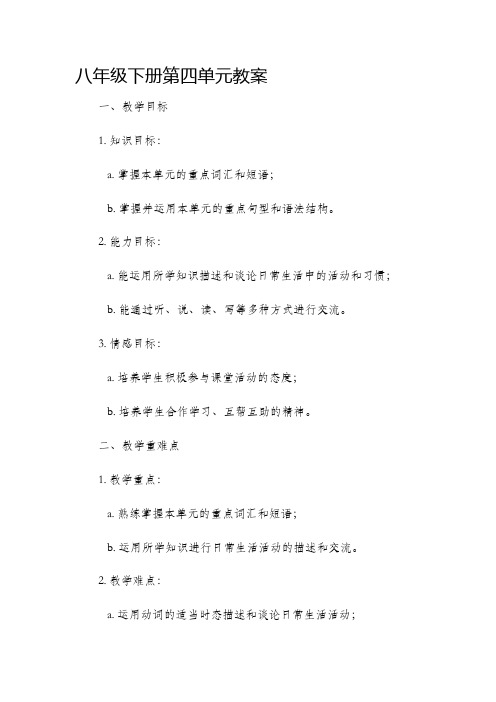
八年级下册第四单元教案一、教学目标1. 知识目标:a. 掌握本单元的重点词汇和短语;b. 掌握并运用本单元的重点句型和语法结构。
2. 能力目标:a. 能运用所学知识描述和谈论日常生活中的活动和习惯;b. 能通过听、说、读、写等多种方式进行交流。
3. 情感目标:a. 培养学生积极参与课堂活动的态度;b. 培养学生合作学习、互帮互助的精神。
二、教学重难点1. 教学重点:a. 熟练掌握本单元的重点词汇和短语;b. 运用所学知识进行日常生活活动的描述和交流。
2. 教学难点:a. 运用动词的适当时态描述和谈论日常生活活动;b. 运用所学知识参与交流活动。
三、教学准备1. 教具准备:a. 多媒体设备;b. 教学课件;c. 黑板和粉笔。
2. 教材准备:a. 《英语八年级下册》教材;b. 本单元课本和练习册。
四、教学过程1. 导入新课(5分钟)a. 利用图片或口头描述引入本单元的话题;b. 提问学生对话题的态度和看法。
2. 学习新知(35分钟)a. 听读课文,学习新的词汇和短语;b. 分组活动,让学生运用所学知识编写对话;c. 集体讨论并展示对话,引导学生进行交流。
3. 巩固训练(35分钟)a. 完成课本上相关练习;b. 进行口语练习,学生两人一组进行对话;c. 教师巡回指导,提供必要的帮助和反馈。
4. 拓展延伸(10分钟)a. 列举更多的日常生活活动和习惯,进行集体讨论;b. 引导学生自主学习相关知识,丰富自己的词汇和表达能力。
5. 课堂总结(5分钟)a. 教师总结本堂课的重点和难点,提醒学生复习巩固;b. 学生反馈自己的学习体会和困难。
五、课后作业1. 完成练习册上相应的练习;2. 总结所学词汇和短语,编写一个短文描述自己的日常活动和习惯。
六、教学反思本节课通过多种教学方法激发学生的学习兴趣,培养了他们积极参与课堂活动的态度。
学生通过听、说、读、写的综合训练,掌握了本单元的词汇和句型,能够运用所学知识进行简单的日常生活交流。
人教版初中八年级英语下册第四单元Unit 4 教案含教学反思

Section A 单词allow v.允许;准许wrong adj.有毛病;错误的guess v.猜测;估计deal n.协议;交易relation n.关系;联系;交往communication n.交流;沟通argue v.争吵;争论cloud n.云;云朵elder n.年纪较长的instead adv.代替;反而;却whatever pron.任何;每一nervous adj.焦虑的;担忧的offer v.主动提出;自愿给予proper adj.正确的;恰当的secondly adv.第二;其次communicate v.交流;沟通explain v.解释;说明clear adj.清楚易懂的;晴朗的copy v.抄袭;模仿;复制;复印return v.归还;回来;返回anymore adv.(常用于否定句和疑问句句末)再也(不);(不)再短语look through快速查看;浏览big deal重要的事work out成功地发展;解决get on with和睦相处;关系良好句型1.Many of them are learning exam skills so that they can get into a good high school and later a good university.他们中很多人正在学习应试技巧以便能考入一所好高中,进而升入一所好大学。
2.The Taylors are a typical American family.泰勒家就是一个典型的美国家庭。
3.And they are always comparing them with other children.而且她们总是将自己的孩子和别的孩子相比较。
语法although, so that及until引导的状语从句知识目标掌握课文中的重点词汇及相关短语,并灵活运用。
能力目标学会谈论问题和给出建议情感目标遇到问题要主动地去和家人、朋友或亲近的人交流;如果身边的人遇到问题,能主动提供帮助;要学会放松、缓解压力。
人教版八年级下册英语教案unit4
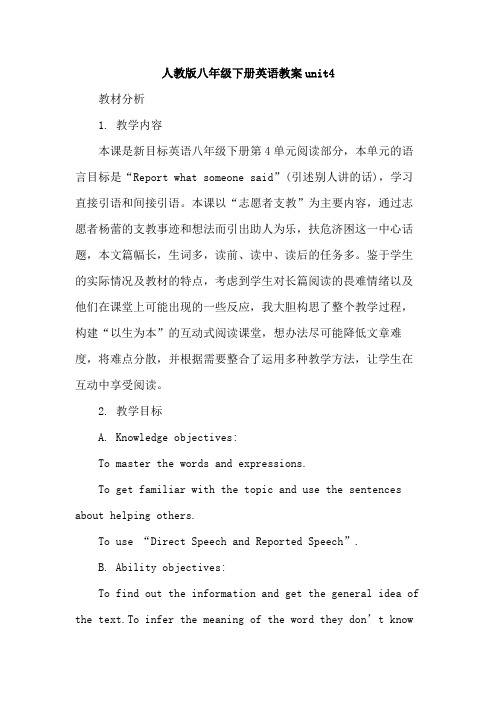
人教版八年级下册英语教案unit4教材分析1. 教学内容本课是新目标英语八年级下册第4单元阅读部分,本单元的语言目标是“Report what someone said”(引述别人讲的话),学习直接引语和间接引语。
本课以“志愿者支教”为主要内容,通过志愿者杨蕾的支教事迹和想法而引出助人为乐,扶危济困这一中心话题,本文篇幅长,生词多,读前、读中、读后的任务多。
鉴于学生的实际情况及教材的特点,考虑到学生对长篇阅读的畏难情绪以及他们在课堂上可能出现的一些反应,我大胆构思了整个教学过程,构建“以生为本”的互动式阅读课堂,想办法尽可能降低文章难度,将难点分散,并根据需要整合了运用多种教学方法,让学生在互动中享受阅读。
2. 教学目标A. Knowledge objectives:To master the words and expressions.To get familiar with the topic and use the sentences about helping others.To use “Direct Speech and Reported Speech”.B. Ability objectives:To find out the information and get the general idea of th e text.To infer the meaning of the word they don’t knowfrom the context.C. Affective objectives:Students are to realize the importance of helping others and they are encouraged to help others.Students’ team spirit will be improved by completing a certain task together.By understanding the life in rural areas, students are to realize how happy they are.3. 教学策略:(1)兴趣激发策略。
人教版八年级下册英语unit4教案及教学反思

人教版八年级下册英语unit4教案及教学反思全文共3篇示例,供读者参考篇1Unit 4 of the People's Education Press Eighth Grade English textbook is focused on the theme of "Hobbies". This unit aims to help students talk about their own hobbies and interests, as well as learn how to express preferences and opinions.Teaching Objectives:1. Enable students to talk about their hobbies and interests in English.2. Introduce vocabulary related to different hobbies.3. Teach students how to express preferences and opinions.4. Improve students' listening, speaking, reading, and writing skills.Teaching Procedures:1. Warm-up activity: Start the lesson by asking students to share their hobbies with the class. This will help to activate their prior knowledge and create a positive learning atmosphere.2. Vocabulary introduction: Introduce key vocabulary related to hobbies, such as "painting", "cooking", "playing sports", etc. Use pictures, gestures, and realia to help students understand and remember the new words.3. Listening comprehension: Play a listening passage where people talk about their hobbies. Students listen and then answer comprehension questions to check their understanding.4. Speaking practice: Divide the class into pairs or groups and ask them to discuss their own hobbies, using the vocabulary they have learned. Encourage students to ask questions and share their opinions with each other.5. Reading activity: Give students a reading passage about different hobbies and ask them to identify key information, such as the benefits of each hobby and how to get started.6. Writing task: Ask students to write a short paragraph about their favorite hobby, describing why they enjoy it and how it makes them feel. Provide feedback on their writing to help improve their language skills.7. Role-play activity: Divide students into pairs and give them a role-play scenario where they discuss their preferencesfor different hobbies. This will help them practice expressing opinions and using the target vocabulary.8. Review and assessment: End the lesson with a review of key vocabulary and concepts covered in the unit. Administer a quiz or speaking activity to assess students' understanding and progress.Teaching Reflection:Overall, teaching Unit 4 on Hobbies was engaging and effective. The activities helped students practice speaking, listening, reading, and writing skills in a fun and interactive way. However, one area for improvement is to provide more opportunities for students to use the target language in real-life contexts. For example, incorporating project-based learning tasks where students create a hobby-themed presentation or video could further enhance their language proficiency.In conclusion, Unit 4 provided a valuable opportunity for students to explore their interests and hobbies in English. By incorporating a variety of activities and assessments, teachers can help students achieve the learning objectives and improve their English language skills.篇2Unit 4 of the People's Education Edition eighth grade English textbook covers the topic of "Wild Animals". In this unit, students will learn vocabulary related to wild animals, practice reading and listening skills through various texts, and improve their ability to describe animals and discuss their habitats.Lesson 1:- Warm-up: Start the lesson by asking students to name different wild animals they know.- Vocabulary: Introduce new vocabulary words related to wild animals such as lion, elephant, tiger, etc.- Reading: Read a short passage about different wild animals and ask students comprehension questions.- Listening: Play a recording of different animal sounds and ask students to match the sound with the correct animal.- Speaking: Have students describe their favorite wild animal and why they like it.Lesson 2:- Warm-up: Review the vocabulary words from the previous lesson by playing a matching game.- Reading: Read a longer passage about a safari trip and ask students to identify the animals mentioned in the text.- Grammar: Introduce comparatives and superlatives using examples related to wild animals (e.g. The elephant is bigger than the giraffe).- Speaking: Have students work in pairs to discuss which animal they think is the most interesting and why.Lesson 3:- Warm-up: Play a game of charades where students act out different wild animals for their classmates to guess.- Reading: Read a passage about endangered animals and discuss why it is important to protect them.- Writing: Have students write a short paragraph about what they can do to help protect endangered animals.- Speaking: Conduct a class debate on whether or not zoos are good for wild animals.Lesson 4:- Warm-up: Review the vocabulary and grammar concepts learned in the previous lessons through a quiz.- Project: Have students work in groups to create a poster about a specific wild animal, including information about its habitat, diet, and interesting facts.- Presentation: Have each group present their poster to the class and answer questions from their classmates.Teaching Reflection:Overall, the unit was engaging and interactive for students. The variety of activities helped to keep students interested and motivated throughout the lessons. The vocabulary and grammar concepts were presented in a clear and concise manner, allowing students to grasp the new material easily. The project at the end of the unit provided students with an opportunity to apply what they had learned and showcase their creativity. However, I would like to incorporate more opportunities for students to practice speaking and listening skills in future lessons to further develop their language proficiency.篇3Unit 4 of the eighth-grade textbook by People's Education Press focuses on the theme of "Wild animals". In this unit, students will learn about various wild animals and their habitats, as well as the importance of wildlife conservation.The unit is divided into several sections, including reading, listening, speaking, and writing tasks. The reading passages describe different wild animals such as lions, elephants, and pandas, providing students with essential information about these creatures. The listening activities help students improve their listening skills by practicing comprehension and understanding spoken English. Speaking tasks encourage students to express their opinions and share information about wild animals with their peers. Writing tasks require students to write short paragraphs or essays about their favorite kind of wild animal or the importance of wildlife conservation.To begin the unit, teachers can introduce the topic of wild animals by showing pictures or videos of different types of wildlife. This can generate interest and curiosity among students, prompting them to learn more about these fascinating creatures. Teachers can also engage students in group discussions or debates about wildlife conservation and the impact of human activities on the environment.During the reading and listening activities, teachers should provide support and guidance to students as they work through the text and audio materials. Encouraging students to ask questions, make predictions, and summarize key points can helpthem better comprehend the information presented. Teachers can also incorporate vocabulary-building exercises, such as word matching or crossword puzzles, to reinforce new words and concepts.For the speaking and writing tasks, teachers can encourage students to use creative expression and critical thinking skills. Providing opportunities for role-playing, storytelling, and collaborative writing can enhance students' language abilities and boost their confidence in using English. Teachers can also assign group projects or presentations that require students to research and present information about specific wild animals or conservation efforts.In conclusion, Unit 4 of the eighth-grade textbook by People's Education Press offers a comprehensive and engaging exploration of wild animals and wildlife conservation. By incorporating a variety of teaching strategies and activities, teachers can facilitate students' learning and language development in a meaningful and enjoyable way. Through active participation and interaction, students can deepen their understanding of the natural world and cultivate a sense of responsibility towards protecting our environment and its inhabitants.。
人教版英语八年级下册教案:Unit4 Why don’t you talk to your pare

Unit4 SectionA〔1a-2d〕教案1.0Teaching Analysis教情分析1.1Teaching Objectives 教学目的1.1.1Language goals 语言目的allow, wrong, guess, deal, allow sb.to do sth., get into a fight with, be angry with, work out, call sb. up, surprise sb., give sth. back, be good at, although, hang out with, have a fight with, wait that long, talk about1) What’s the matter? P252) What’s wrong? P253) My parents don’t allow me to hang out with my friends. P254) I got into a fight with my best friend? P255) You should call him up. P266) I don’t want to talk about it on the phone. P267) What should I do? P268) But why don’t you forget about it so that you can be friends again? P269) Hope things work out. P2610) I guess you could tell her to say sorry. P2611) I found my sister looking through my things yesterday. P261) I have to study too much so I don’t get enough sleep. P26 (so 作连词,意为“因此,所以〞,表示因果关系。
人教版八年级下册第四单元Why don't you talk to your parents 教案

人教版八年级下册Unit 4 Why don’t you talk to your parents ?Section A 3a-3c教学重难点教材分析1.教学内容分析本课例的教学内容是人教版八年级下册Unit A 3a-3c,课型为阅读课。
本单元的话题是Family Relations,功能是Talk about problems and give advice, 基本结构有:You should …Why don’t you … ? Maybe you could …本课所选的Section A 3a是两封简短的信,第一封是一个笔名为Sad and Thirteen的女孩向她的老师Mr Hunt 写的求助信。
第二封是Mr Hunt给她提出的建议。
两封信在篇章结构和语言组织上有共同的特点:信的首句为主题句;使用不同的句式来谈论问题和提出建议;使用恰当的连词连结句子,语言紧凑连贯。
2.学生分析我校是农村学校,师资水平和城里的学校比,有一定的差距。
中学生的英语水平不如城里的学生,但是高于其他偏远学校中学生的英语水平。
本节课的话题为家庭关系,与学生的实际生活紧密相关,每个学生的家庭或多或少都有这样或那样的问题,经历相似,因而有话想说,有话可说。
【教学目标】基于对教学内容和学生情况的分析,本课预设了以下目标:1.掌握文中的词汇relation 、communication、argue 、refuse、nervous 、get oninstead、explain 和secondly的用法;2.在语境中感知、理解和运用不同句式描述问题和给出建议;3.学习和掌握阅读策略,根据话题对文章的内容进行预测,通过理解首句快速提炼文章的主旨大意,通过查找关键词迅速地切入文章内容。
4.在预测中充分想象和表达;正确判断教师和同学们的建议;根据信息的逻辑关系进行分析和判断,逐步形成多元思维的习惯。
5.根据短文的文本特征让学生进行仿写练习,恰当运用主题句和连词陈述自己的问题并对他人的观点提出疑点并表达自己的观点6.认识到每个人在成长的过程中总会遇到这样那样的问题,关键是如何面对,积极寻找解决问题的办法。
牛津译林版英语八下_Unit 4 ReadingⅠ精品教案

(2)Someone tied Gulliver’s arms, legs, and hair to the ground.
人教版八年级英语下册Unit4 写作课教学设计(公开课教案)

Unit4 Why don’t you talk to your parents.写作课教学设计Teaching aims:Knowledge aims:Students could get familiar with after-school class and can express their opinions about it.Ability aims:Students will improve their writing and speaking abilities.Students will be able to collect writing materials and organize them according to one point.Emotional aims:Learning this lesson, students will know how to express their opinions logically.Students will learn to consider problems objectively and rationally.Teaching key points and difficult points:Key points:Students can make notes while discussion and arrange their arguments.Difficult Points:Students will learn to consider problems objectively and rationally.Teaching procedures:Step 1 Lead-in1.Greet students.2.Ask students questions “After school, what activities do you usually do?” and show some pictures about activities such as play basketball, play the piano and paint. Students will respond this question actively. In this way, I will lead to today’s topic “ your opinion on after-school classes for children”.(Justification: The question is closely related with the current situation of them and they would actively give answers. The teacher can lead the topic very naturally and it can also arouse students’ interest.)Step 2 Pre-writing1.Debate: Divide students into 2 groups and have a debate about “Your opinions on after-school class for children” One opinion is children should have after-school class because…/ The other opinion is children should not have after-school class because…. While the debate, the teacher will remind students to make notes of the reasons and then conclude the two opinions with students.eful expressions: ask students to pay attention to some conjunction words, such as firstly, then, in a word. And some sentence structures: I don’t really agree with... because...3.Outlining: Ask students to read 3b in the book, and illustrate the formation of letter.(Justification: through debating, students will have the material to write the letter. Through expression learning, the letter will be more logically. This part will lay a foundation for the following writing steps.) Step 3 While-writingDrafting: Ask students write a letter to the magazine to express their expressions on after-school class for children. Give students 15 minutes to write a draft.(Justification: Through writing by themselves, students’ writing ability will be improved.)Step 4 Post-writing1. Peer editing: After the drafting, ask students to check their articles with desk mates. They should read the passage and check the ideas or the logical development. Also, check carefully the grammar, spelling and punctuation of their writings.2. Ask several students to read their passages and then give someevaluations from the advantages and disadvantages.Then ask students to revise their articles according to the evaluations(Justification: The peer editing will help them find the mistakes about spelling , the grammar and the logic, which is a way to learn by themselves. They also learn the advantages and disadvantages from others. ) Step 5 Summary and homeworkSummary:Ask students to act as an assistant teacher to conclude what we have learned this class. And then the teacher will make some supplements.Homework:Do an interview: Ask your family members about their expressions on after-school class for children. And tell your parents your opinions about after-school class.Blackboard design:Expressions on after-school classDear XX,Children should have after-school class/ Children should not haveafter-school classFirstly,Then,In a word,Yours,XXX。
八年级英语下册Unit4Whydon’tyoutalktoyourparents第4课时SectionB1a_2e教案新版人教新目标版

Unit 4 Why don’t you talk to your parents课题Section B 1 (1a-2e)课型新授课教学目标1. 语言知识目标:1) 能掌握以下单词:member, pressure, compete, opinion, skill, typical, football, cut out, continue, compare, compare…with, crazy, push, de velopment, cause, usual2) 能掌握以下句型:① I think Wei Ming should…② Although you may be…, you should talk to them.③ Life shouldn’t just be about …④ Why don’t they just let their kids be kids?⑤ Al though it’s normal to want successful children, it’s even more important to ha ve happy children.2. 情感态度价值观目标:了解中国及一些其他国家中学生们普通存在的生活及学习上问题,了解别人的生活现状及他们苦恼,知道学习知识是很重要的事情,但它并不是生活的全部。
重点 1) 掌握本课时出现的生词及用法。
2) 进行听力训练,提高综合听说能力。
3) 阅读短文,获得相关信息,提高学生们的综合阅读能力。
难点1. 听力训练2. 阅读2b部分的短文并完成相关要求。
教学用具多媒体教学环节说明二次备课复习新课导入课程讲授Step 1 Revision1. Daily greeting.2. 复习提建议的表达方式,并完成相关任务。
3. Check the homework. Let some Ss give advice.Step 2 Warming up1. T: Show a picture of student.—What’s wrong with the girl?—She’s too stressed out.—What should she do? Can you give her some advice?2. Ss discuss the problem and give some advices:e.g.S1: Why not hang out with her friends.S2: She could play sports.S3: She could play computer games.S4: She should listen t o music and read some books.Step 3 WritingWork on 1b1. Ask one student read the sentences in 1a. Explain some main sentences.2. What activities do you like to help lower your stress? Orderthem from 1-8 with being the most favorite thing you do to lower stress.3. Ss discuss with their desk mates then order them.4. Let some Ss say their answersStep 4 TalkingLet some Ss talk about their answers.S1: I always hang out with my friends to lower stress.S2: I like to listen to music to lower stress best.Step 5 ListeningWork on 1c:1. Tell Ss to read the sentences 1c first.2. Play the recording for the Ss. Ss just listen for the first time. Play the recording again and check the problems Wei Ming talks about.3. Check the answers:Work on 1d:1. Let Ss read the sentences in 1d first. Tell Ss to listen again and fill in the blanks.2. Play the recording again for the Ss to listen and write.3. Ss listen to the recording carefully and try to write the words in the blan ks.4. Check the answers with the class.Step 6 Pair work1. Work in pairs. Suppose your partner is Wei Ming. You try totell her some advice and say why.2. Let two students make a model for the Ss.3. Ss practice their conversations4. Teacher can walk around the classroom, and give some help to the Ss.Step 7 Thinking1. T: There are some after-school activities. What activities doyou and your classmates usually do? Check them.2. Ss check the activities they usually do.3. Ask some Ss say their choices.Step 8 ReadingWarming upWhat did you do after school?Do you have stress in your life?How do you relax yourself?Fast Reading1. T: Now let’s work on 2b. First, let’s read the questions andmake sure we know the mea nings of all the questions. Thenread the passage quickly and find the answers to thequestions.1) What is the common problem for Chinese and American families?2) Who gives their opinions about the problems?2. Ss read the letter quickly and try to find the answers to the two questions.3. Check the answers wit h the class.Careful Reading1. T: Now let’s read these sentences about the letter. Read thepassage again. Judge if the sentences are True or False.Please underline under the main sentences.1) Chinese children have to take so many after-school classeson weekends these days.2) Cathy Taylor really wants her three children to besuccessful, so she believes these after-school activitiesare important for them.3) Linda Miller thinks parents should send their small kids toall kinds of classes.4) Linda thinks some parents push their kids too much.5) Alice thinks kids shouldn’t have time to relax and think for themselves2. Ss read the letter again and judge the sentences.3. Check the answers with the class.Post readingWork on 2c1. Now look at the words in bold in the article. Can you guesstheir meanings? Try to match them with the meaning below.2. Let Ss read and try to match the words.3. Give Ss some advice on how to do it.4. Check the answers with the Ss.5. Give some explanation about the difficult words.Work on 2d1. Tell Ss to read the passage again and answer these questionsbelow.1) Does Cathy Taylor think it’s important for kids to join afterschool activities?2) Does Linda Miller agree with Cathy? What’s her opinion?3) Does Dr. Green agree with Cathy or Linda? What does she say?2. Ss work by themselves.3. Check the answers toge ther.小结Summary作业布置Homework1. Read the article again after school.2. Write a short passage about Cath y’s daily life and her opinionsabout the education of the kids.板书设计课后反思Unit 10 I’ve had this bike for three years课题Unit 10 I’ve had this bike for three years. 课型新授课Section A1 (1a-2d)教学目标一、知识与技能1.掌握本课单词和短语:search am ong,crayon,shame,regard…as count,century,according to,opposite,especially,memory,consider,hold2. 能从阅读中获得自己周围的事物变化的相关信息。
人教版八年级下英语第四单元unit4教案及练习

Unit4He said I was hard-working.1.Fill in the blanks with the words given.happen bring copy borrow pass on复制抄袭1.Can you some music CDs to the party?2.It’s not right for you to others’homework.3.He didn’t know what was outside.4.I’m so cold.Can I your jacket?5.I’m seeing Sue this afternoon.Do you want meto any messages?2.Read the story and then write it as a conversation.My best friend is Xiao Li,but last week in school we had a big fight,and she didn’t talk to me.It all started when she ask ed me if she could copy my homework.I ask ed her why she wanted to do that,and she said that she had forgotten to do hers.I said I didn’t think it was a good idea for her to copy my homework.She wanted to know why I didn’t think it was a good idea.I said it would start a bad habit,and that she should do her own work.She got really mad at me,and said she didn’t want to be my best friend anymore.I said that was OK and that I was sure she would get over it.And she did.Y esterday she told me she was sorry.She said it was mu ch better if she did her own workhers她的(名词性物主代词)own自己的get over克服;忘掉;原谅Language Points1.I ask ed her why she wanted to do that,and she said that she had forgotten to do hers.我问她为什么要那么做,她说她忘记做作业了。
人教版八下英语Unit4全单元教案(经典建议收藏)
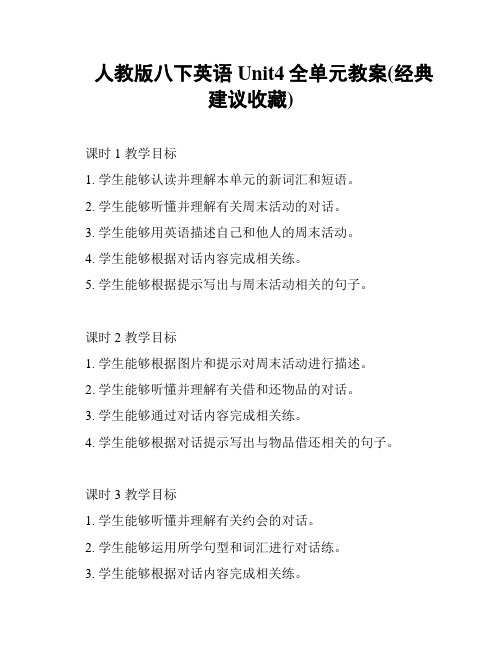
人教版八下英语Unit4全单元教案(经典建议收藏)课时1 教学目标1. 学生能够认读并理解本单元的新词汇和短语。
2. 学生能够听懂并理解有关周末活动的对话。
3. 学生能够用英语描述自己和他人的周末活动。
4. 学生能够根据对话内容完成相关练。
5. 学生能够根据提示写出与周末活动相关的句子。
课时2 教学目标1. 学生能够根据图片和提示对周末活动进行描述。
2. 学生能够听懂并理解有关借和还物品的对话。
3. 学生能够通过对话内容完成相关练。
4. 学生能够根据对话提示写出与物品借还相关的句子。
课时3 教学目标1. 学生能够听懂并理解有关约会的对话。
2. 学生能够运用所学句型和词汇进行对话练。
3. 学生能够根据对话内容完成相关练。
4. 学生能够用英语描述自己的约会经历。
5. 学生能够根据提示写出与约会相关的句子。
课时4 教学目标1. 学生能够听懂并理解有关邀请的对话。
2. 学生能够根据对话内容完成相关练。
3. 学生能够根据提示写出与邀请相关的句子。
课时5 教学目标1. 学生能够听懂并理解一篇有关暑假计划的短文。
2. 学生能够运用所学句型和词汇进行短文理解和书面表达练。
3. 学生能够根据短文内容完成相关练。
4. 学生能够用英语描述自己的暑假计划。
5. 学生能够根据提示写出与暑假计划相关的句子。
课时6 教学目标1. 学生能够运用词汇和句型描述日常生活中的活动。
2. 学生能够运用所学句型和词汇进行对话练。
3. 学生能够根据对话内容完成相关练。
4. 学生能够根据提示写出与日常活动相关的句子。
课时7 教学目标1. 学生能够听懂并理解有关节日庆祝的对话。
2. 学生能够用英语描述自己喜欢的节日。
3. 学生能够运用所学句型和词汇进行对话练。
4. 学生能够根据对话内容完成相关练。
5. 学生能够根据提示写出与节日庆祝相关的句子。
课时8 教学目标1. 学生能够听懂并理解有关健康惯的对话。
2. 学生能够根据对话内容完成相关练。
3. 学生能够用英语描述自己和他人的健康惯。
人教版八年级下册第四单元Unit 4 Why don't you talk to your parent教案

Unit 4 Why don’t you talk to your parents?Section A 1 (1a-2d)一、教学目标:1. 语言知识目标:1) 能掌握以下单词:allow, wrong, guess, deal, work out能掌握以下句型:①—What’s wrong?—I’m reall y tried because I studied until midnight last night.② You could give him a ticket to a ball game.③ I think you should ask your parents for some money.④ Why don’t you talk to him about it?2) 能了解以下语法:(1)能够运用所学知识谈论问题和困难、提出建议并做出选择;(2)能根据对方所提出的问题,给出一些合理的建议。
2. 情感态度价值观目标:培养学生良好的合作意识,鼓励学生大胆表达自己的想法和意愿。
正确认识生活中的一些困难,能采用正确的方式解决生活中的问题。
二、教学重难点1. 教学重点:1) Talk about the problems.2) Learn the new language points.2. 教学难点:能根据对方所提出的问题,给出一些合理的建议。
学会表达建议的一些方式。
三、教学过程Step 1 Warming up1. 导入学生们平时在学校和生活中存在的问题。
T: What’s the matter/ What’s wrong?S: He has too much homework to do.T: Does he like to do it?S1:No, he doesn’t. Because he doesn’t have any free time to do things he likes. …Step 2 Talking1. Look at these problems. Do you think they are serious or not? Ss discuss with their partners and give some advice.①I have to study too much so I don’t get enough sleep.②I have too much homework so I don’t have any free time to do things I like.③My parents don’t allow me to hang out with my friends.④I have too many after-school classes.⑤I got into a fight with my best friend.Step 3 Listening1. T: Tell Ss to read the sentences in 1a again. Make sure they know the meaning of the sentences.2. Play the recording for the Ss to listen and circle the problems you hear in 1a.3. Play the recording again. Check the answers with the Ss.Step 4 Pair work1. Let Ss read the conversation in the box.2. Use the information in 1a to make other conversations.3. Let some pairs act out their conversations.e.g. A: What’s wrong?B: I’m really tied because I studied until midnight last night.A: Why don’t you go to sleep earlier this evening?4. Language points1) allow v. 允许;准许allow sb. (not)to do sth. (不)允许某人做某事e.g. My parents don’t allow me to stay up late. 我父母不允许我熬夜。
人教版英语八下UNIT4教案

人教版英语八下U N I T4教案(总19页)--本页仅作为文档封面,使用时请直接删除即可----内页可以根据需求调整合适字体及大小--Unit 4 Why don’t you talk to your parents?Section A【知识导入】have to study too much so I don’t get enough sleep.(P25)(1) have to 句型: have to “必须,不得不做某事”,与must 相比更有一种“被迫的”意思,后接动词原形。
Example: I have to clean my room. (可能是妈妈要求我必须去清理,而我自己还并没有想去)I must clean my room.(是我自己认为必须要清理一下房间了)(2)too much 表示“太多”可以跟在动词后面,例如:work too much ,eat too much (这是too much 是作为一个副词修饰前面的动词)或者后面接不可数名词,例如:too much homework,too much money (这里too much 是作为一个形容词来修饰后面的不可数名词)Too much 在口语中也可以表示“太过分了,太不像话了”(3)Enough 表示“足够的,足够地,很多,充足”Enough 当作为副词时,要跟在动词或者形容词后面,例如:good enough,sleep enough;当作为形容词时,后面可以接名词,例如:enough water,enough time。
Enough!在口语中表示“够了”,通常是带有情绪的表达。
有少数情况下,enough可以作为名词,当后面跟的是个代词时,要加of,例如:We have had enough of you! 我已经受够你了。
parents don’t allow me to hang out with my friends.(P25)(1)allow sb to do 表示“允许某人去做某事”类似用法:permit sb to do sth 允许某人去做某事;agree ab to do ath 同意某人去做某事tell sb to do sth 告诉某人做某事;refuse to do sth 拒绝做某事(2) hang out当为hang sth out 时是表示挂出,例如:I want to hang my clothes out.我想把我的衣服挂到外面去。
Unit4Task教案牛津译林版英语八年级下册
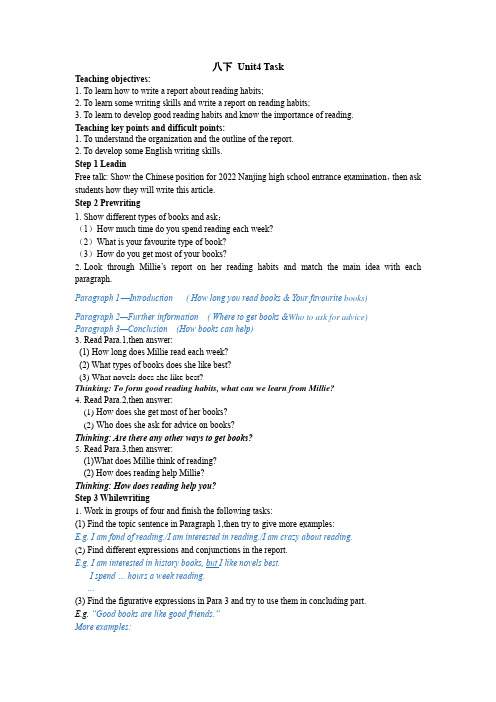
八下Unit4 TaskTeaching objectives:1. To learn how to write a report about reading habits;2. To learn some writing skills and write a report on reading habits;3. To learn to develop good reading habits and know the importance of reading.Teaching key points and difficult points:1. To understand the organization and the outline of the report.2. To develop some English writing skills.Step 1 LeadinFree talk: Show the Chinese position for 2022 Nanjing high school entrance examination,then ask students how they will write this article.Step 2 Prewriting1. Show different types of books and ask:(1)How much time do you spend reading each week?(2)What is your favourite type of book?(3)How do you get most of your books?2.Look through Millie’s report on her reading habits and match the main idea with each paragraph.Paragraph 1—Introduction ( How long you read books & Your favourite books)Paragraph 2—Further information ( Where to get books &Who to ask for advice)Paragraph 3—Conclusion (How books can help)3.Read Para.1,then answer:(1) How long does Millie read each week?(2) What types of books does she like best?(3) What novels does she like best?Thinking: To form good reading habits, what can we learn from Millie?4.Read Para.2,then answer:(1)How does she get most of her books?(2)Who does she ask for advice on books?Thinking: Are there any other ways to get books?5.Read Para.3,then answer:(1)What does Millie think of reading?(2) How does reading help Millie?Thinking: How does reading help you?Step 3 Whilewriting1.Work in groups of four and finish the following tasks:(1) Find the topic sentence in Paragraph 1,then try to give more examples:E.g. I am fond of reading./I am interested in reading./I am crazy about reading.(2)Find different expressions and conjunctions in the report.E.g. I am interested in history books, but I like novels best.I spend … hours a week reading....(3) Find the figurative expressions in Para 3 and try to use them in concluding part.E.g. “Good books are like good friends.”More examples:“Reading a good book is like talking to a noble man.”“ A good book is like a ship,leading us from narrow overflow to an indefinite ocean.”2.Work in pairs: Finish a survey on reading habits on P60 and make up a dialogue about your reading habits.3.Work in groups of four: Now you’ve been invited to the 2022 Jiangsu Book Fair (Nanjing Yuhuatai District). Write a report on your reading habits and share with others. And try to give some advice on developing good reading habits.S1: Introduction ( You personal information & How long you read books & Your favourite books) S2: Further information ( Where to get books &Who to ask for advice)S3: Importance (How books can help)S4: Advice (How to develop good reading habits)4. Choose 12 groups to show their reports and ask other students to give some suggestions. Help Ss polish their writings.Step4 Postwriting1.Show some researches on teenager reading in China and America.2.Watch a video: The importance of reading Professor Zhen. Then ask Ss to think about why it is important for us to develop good reading habits.Step 5 Summary1.Conclude how to write a report on good reading habits.2.Conclude the importance of reading.3.Enjoy reading! Enjoy life.Step 6 HomeworkLevel A: Make a better plan to develop the reading habits and share it with your partners in English.Level B: Hold a Reading Salon at the class meeting this Friday. Prepare for sharing books and ideas with each other in English.。
- 1、下载文档前请自行甄别文档内容的完整性,平台不提供额外的编辑、内容补充、找答案等附加服务。
- 2、"仅部分预览"的文档,不可在线预览部分如存在完整性等问题,可反馈申请退款(可完整预览的文档不适用该条件!)。
- 3、如文档侵犯您的权益,请联系客服反馈,我们会尽快为您处理(人工客服工作时间:9:00-18:30)。
Unit 4 Cartoons and comic stripsPeriod 1 word课题: Word课时:第1课时课型:word教学目标:1) To teach Ss words2) To read and understand the new words3) Let student read words confidently教学重点:1)既要学会用读单词,也要学会用音标记单词。
2)理解单词的意思教学难点:Train Ss’memory and let students know how to read words accord to phonetic.教学步骤:Warm-up:Step 1:让学生以小组为单位认识所学的单词,并能根据音标自己拼读。
Presentation:Step 2: 让学生自主读单词,4人一小组,每个小组2-3个单词。
Step 3:每个小组读完2-3单词时,邀请同学来评改指正,最后由老师来做最后的纠正和评价。
Step4:依次轮流,遇到学生读错或者不会的,老师先不急着纠正,由成绩好的同学先说,如仍有困难,然后老师板书音标,最后大家一起拼读。
tip:遇到词性不同意思不一样的问下学生或有些合成词可以教他们方法记忆。
Step5: play the recording (学生跟读录音)Step 6: Practice1.(competition)听完录音后,先全班齐读一遍,然后竞赛的形式来检验学生掌握情况)。
2. 练习册34页。
Homework1) 每个单词抄三遍,中文一遍。
2) 完成练习册和Book B Vocabulary A 部分Reflection:Period 2 Reading课题: Reading课时: 第 2 课时,课型: reading教学目标:1) To teach Ss main contents of reading2) To know how to make a cartoon3) To train Ss’ reading skill---skimming and scanning教学重点:learn to know the structure and contents of the main article reading skill---skimming and scanning教学难点:学生初步了解文章大意和掌握文章的结构教学步骤:Step1:Do you like reading comic strips?Why? Because the pictures in comic strips are very interesting Step 2:What do you know about…?(Many symbols in comic strips to show special meanings. Match the symbols below with their meanings.)Step 3:First reading- Skimming1.阅读引言回答两个问题What is Jason learning about?Where did he find this information?2.B Before you read阅读篇章中的每一段的第一句话,了解动画制作的步骤。
完成排序。
Step4:Second- reading- scanning1.阅读1-8行,完成表格,了解一个动画故事的基本要素。
Place at the underground stationCharacter Han, Tim, SarahThe story Han bought a notebook so he wouldn’t forgetthings . However, when Sarah took out her notebook, Han …2.阅读9-13行。
然后请会绘画同学来画出Han Tim Sarah 画像3.学生阅读14-20行判断正误First, we should draw detailed pictures. FDetailed pictures are drawn using pencils. FWe only need one picture to make the characters and things appear to move. FA computer program can put the pictures together and make them move.F3.阅读21-26行,然后区分那些是人声那些是音效?a. I ‘m happy.b. drip-dropc. Yes, I have one too.d. Now I won’t forget things.e. Where’s yours, Han?f. zzzzzzg. I forget to bring it!h. grrrri。
tick-tockVoices : acdeg Sound effects: bfhiStep 5:听录音再阅读课文Step 6:Homework1) 模仿录音的语音,语调,朗诵课文并完成课本的52,53页2) 完成练习册Reflection:Period 3 Reading课题:Reading课时:第3 课时课型:reading教学目标:1)To know how to make a cartoon according the article.2) To try to know the mind-map教学重点:Retell the article, according the mind-map.教学难点:懂得动画制作的过程教学过程:Step1:指名学生读课文,完成52页C1 C2方法指点:C1在原文中找到原句与斜体单词一致的。
C2。
知道方框里的单词意思,再来阅读这邮件。
Step 2: 再次阅读,完成课本P53 D1 Comprehension. (1) (5)Step 3: 再次阅读教材53页Strategy部分内容,完成流程图。
Step1: Decide on the basic idea.Step2:Think about the characters and what they will look like.Step3: Make a rough sketch.Step4:Draw detailed pictures and add colour.Step5: Put the pictures together as a filmStep6: Record the voices and sound effects. Step4: 全班朗读课文,分组朗读比赛。
Homework:1.画思维导图,帮助背诵文章。
2. 英语周报的Reading课题:Reading课时:第4 课时课型:reading教学目标:1)Let Ss read the article fluently2) to translate the article and explain the important words and sentence. 教学重点:掌握重要的单词短语知识点和课文的翻译。
教学难点:能够在句子中熟练运用单词短语,诵读课文。
教学过程:Step1:全班一起朗读课文,指正错误。
听写Step 2:展示导图,表扬画的好的同学,同时老师展示自己的导图。
Step 3:S1 Read the first stage S2 Translate the first stage学生指正错误,老师帮助分析错误。
请同学找出短语,并尝试造句。
make a cartoondecide on She has decided on a new car.forget to do, forget doingat the underground station…方法依次:the second stage S1 read S2 Translate1.think of 思考,想起,记得e.g I am thinking of going to Paris for vacation.What do you think of…?你认为……怎么样?2.Make a rough sketch of the story. e.g He made a rough drawing.3.decide on 决定,选定He decided on carrying out the plan at last.4.base- basis(n)基础- basic (adj)基本的-basically(adv)基本上5.Here it is.本句为倒装句。
以here或there 开头的句子,若后面的主语为人称代词,主谓不倒装。
Here you are. Here comes the bus. There goes the bell.6.forget to do sth I forget to open the door.forget doing sth I forget opening the door.7.look like Little Billy looks like his mother.提问长相:What do/does sb look like?提问性格:What is sb like?8.video cameras 摄像机wear=be in 穿戴,强调穿戴的状态。
put on 则强调穿戴动作9. appear连系动词意为显得,看来似乎,appear+(to be)+adj/nShe appears(to be) happy at the news.她听到这个消息时显得高兴。
appear + to do sth . You appears to travel quite a lot.你好像走过很多地方。
a little 有点儿She is a little afraid of the teacher.可以用于句型It appears / appeared that 看起来…a little /a bit 1)两者可以作副词修饰形容词原形或比较级或动词。
I am a little hungry. 2)用作形容词作定语a little +Un , a bit +of +Un There is a little/ a bit of water in the bottle.3)两者前面加not,则其意义完全不同。
not a bit= not at all 通常作状语;not a little= very ,可用作状语或定语。
